Sarah Sundin's Blog, page 534
January 26, 2011
Book Club Beat - All Together in One Place by Jane Kirkpatrick
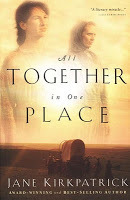 Welcome to Book Club Beat, where book clubs share about their discussions.
Welcome to Book Club Beat, where book clubs share about their discussions.Book club name and location: Bibliovores, northern California
Book: All Together in One Place by Jane Kirkpatrick (WaterBrook Press, 2002)
What it's about: When Mazy Bacon and her husband head west on the Oregon Trail, Mazy finds her boundaries stretched in uncomfortable directions. Tragedy befalls the wagon train, and Mazy and eleven other women bind together for survival and companionship.
Were discussion questions available? None in the back of the book or on-line that we could find.
What we liked about the book: We loved Ms. Kirkpatrick's gorgeous prose and many deep, quotable thoughts and insights. One group member had multiple sticky tabs throughout the book with her favorites marked. We enjoyed the diverse and intriguing characters, and how they bonded in a realistic manner due to adversity. Th difficulties of life on the Oregon Trail became real to us.
Anything we would change about the book? Not really. However, please note that this is the first in a three-book series, so many of the plot questions remained unresolved at the end of the book.
Fun connections (did the story inspire food, decorations, favors, etc.?): Not this time. For some reason, none of us was terribly interested in Oregon Trail cuisine.
Deep connections (this story made us think about the following discussion topics): We did discuss women's friendships and how adversity brings people together, but this book sparked fewer discussion points than other books we've read. Most of our discussion focused on the characters and what made them tick.
Do you recommend this book for other book clubs? Yes - remembering that this is the first in a series. The theme of women supporting each other resonates well for a women's book club.
Thanks for joining me today! If you belong to a book club and would like your group to be featured here, let me know! Pictures of the book club can be included if you'd like. Christian or "clean secular" fiction/nonfiction only please. The questionnaire is short, and I'll obtain the book cover and story blurb.
If you're looking for a book club, check out the Book Club Network at http://www.bookfun.org/ , an on-line meeting place for Christian book club members and authors. Over 800 members and it's only a few months old! Join the fun!
Published on January 26, 2011 05:00
January 25, 2011
Today in World War II History
70 Years Ago—Jan. 25, 1941: British lead forces from various African colonies to invade Italian Somaliland from Kenya.
Published on January 25, 2011 07:08
Today in World War II History
70 Years Ago—Jan. 25, 1941: Japanese set up puppet government in Thailand.
Published on January 25, 2011 03:00
January 24, 2011
Make It Do - Gasoline Rationing in World War II
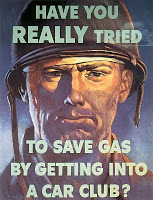 Rationing was an important part of life in America during World War II. However, the government was apprehensive about gasoline rationing. As a symbol of freedom of movement, the automobile represented everything American, and politicians feared riots and rebellion if they curtailed that freedom. Rubber Shortage What tipped the balance wasn't a gasoline shortage but a rubber shortage. As discussed last week (http://sarahsundin.blogspot.com/2011/01/make-it-do-tire-rationing-in-world-war.html), the United States faced a serious shortage of rubber and didn't have enough for military needs, much less civilian needs. While tires and other rubber items were rationed, the simplest way to reduce wear and tear on tires was to restrict driving.
Rationing was an important part of life in America during World War II. However, the government was apprehensive about gasoline rationing. As a symbol of freedom of movement, the automobile represented everything American, and politicians feared riots and rebellion if they curtailed that freedom. Rubber Shortage What tipped the balance wasn't a gasoline shortage but a rubber shortage. As discussed last week (http://sarahsundin.blogspot.com/2011/01/make-it-do-tire-rationing-in-world-war.html), the United States faced a serious shortage of rubber and didn't have enough for military needs, much less civilian needs. While tires and other rubber items were rationed, the simplest way to reduce wear and tear on tires was to restrict driving.Drive Less
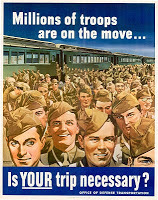 In 1942, a nationwide Victory Speed of 35 mph was instituted, since higher speeds remove tread more quickly. People were encouraged to use Victory Bicycles (except new bictycles weren't manufactured), public transportation, and their own two feet. Commuters were told to "Carry more to win the war," and to share rides or form car clubs (the term "car pool" wasn't used yet). Employers experimented with staggered shifts to reduce traffic - and therefore, gasoline use. Pleasure driving was discouraged and the "Vacation at Home" was promoted, not just to save gas and rubber, but due to the strain on the nation's train system by military transport. Fewer Cars Car manufacturing stopped on Jan. 1, 1942, and no new automobiles could be purchased after Feb. 22, 1942. A small stock was held in reserve for critical replacements. The auto manufacturers converted their assembly lines to produce jeeps, tanks, and bombers, while the American consumer made do. Car theft became a larger problem than ever. On July 1, 1945, automobile production was allowed again, and the first car rolled off the assembly line on Aug. 30, 1945 - a Hudson Super Six coupe.
In 1942, a nationwide Victory Speed of 35 mph was instituted, since higher speeds remove tread more quickly. People were encouraged to use Victory Bicycles (except new bictycles weren't manufactured), public transportation, and their own two feet. Commuters were told to "Carry more to win the war," and to share rides or form car clubs (the term "car pool" wasn't used yet). Employers experimented with staggered shifts to reduce traffic - and therefore, gasoline use. Pleasure driving was discouraged and the "Vacation at Home" was promoted, not just to save gas and rubber, but due to the strain on the nation's train system by military transport. Fewer Cars Car manufacturing stopped on Jan. 1, 1942, and no new automobiles could be purchased after Feb. 22, 1942. A small stock was held in reserve for critical replacements. The auto manufacturers converted their assembly lines to produce jeeps, tanks, and bombers, while the American consumer made do. Car theft became a larger problem than ever. On July 1, 1945, automobile production was allowed again, and the first car rolled off the assembly line on Aug. 30, 1945 - a Hudson Super Six coupe.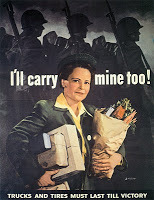 Gasoline Rationing Begins Voluntary programs didn't do the job. The rubber situation became critical, and on May 15, 1942, 8 million motorists in eighteen Eastern states registered for gas ration cards. Rationing began on the East Coast on July 22, 1942. These states were chosen due to better public transportation and shorter distances traveled, and because the U-boat menace off the East Coast made transport of oil and gasoline more hazardous. However, this also wasn't enough, and on Dec. 1, 1942, rationing went into effect nationwide. The program would continue until Aug. 15, 1945. Stickers and Coupons The American public learned to deal with an elaborate system. Every motorist was issued a windshield sticker displaying a letter: "A" (most motorists - 3 gallons/week), "B" (for war workers to get to their jobs - 8 gal/wk), "C" (for those who used their cars on the job, such as physicians, clergy, and mail carriers), "T" (truckers - unlimited), "R" (non-highway farm vehicles - unlimited), "E" (emergency vehicles such as ambulances, police, fire - unlimited), and "X" (a controversial unlimited sticker for VIPs - unlimited). Some of these categories changed, emerged, or were eliminated during the war. At the gas station, the attendant checked the windshield sticker and took the required number of ration book coupons - also marked with the appropriate letter. Of course, payment was also required - about 19 cents/gallon. Gas Shortage Despite rationing, a serious gas shortage developed early in 1944. The high military use and restricted shipping contributed to this problem. In January 1944 on the West Coast, very little gasoline was available - and none at all in Sacramento, California. On March 22, 1944, "A" class drivers were further restricted to 2 gallons/week. Not everyone complied. The black market became quite profitable, cases of gas siphoning made the front page of small-town newspapers, and several ration book forgery rings were broken up. How do you think modern-day Americans would deal with these restrictions?
Gasoline Rationing Begins Voluntary programs didn't do the job. The rubber situation became critical, and on May 15, 1942, 8 million motorists in eighteen Eastern states registered for gas ration cards. Rationing began on the East Coast on July 22, 1942. These states were chosen due to better public transportation and shorter distances traveled, and because the U-boat menace off the East Coast made transport of oil and gasoline more hazardous. However, this also wasn't enough, and on Dec. 1, 1942, rationing went into effect nationwide. The program would continue until Aug. 15, 1945. Stickers and Coupons The American public learned to deal with an elaborate system. Every motorist was issued a windshield sticker displaying a letter: "A" (most motorists - 3 gallons/week), "B" (for war workers to get to their jobs - 8 gal/wk), "C" (for those who used their cars on the job, such as physicians, clergy, and mail carriers), "T" (truckers - unlimited), "R" (non-highway farm vehicles - unlimited), "E" (emergency vehicles such as ambulances, police, fire - unlimited), and "X" (a controversial unlimited sticker for VIPs - unlimited). Some of these categories changed, emerged, or were eliminated during the war. At the gas station, the attendant checked the windshield sticker and took the required number of ration book coupons - also marked with the appropriate letter. Of course, payment was also required - about 19 cents/gallon. Gas Shortage Despite rationing, a serious gas shortage developed early in 1944. The high military use and restricted shipping contributed to this problem. In January 1944 on the West Coast, very little gasoline was available - and none at all in Sacramento, California. On March 22, 1944, "A" class drivers were further restricted to 2 gallons/week. Not everyone complied. The black market became quite profitable, cases of gas siphoning made the front page of small-town newspapers, and several ration book forgery rings were broken up. How do you think modern-day Americans would deal with these restrictions?
Published on January 24, 2011 05:00
Today in World War II History
70 Years Ago—Jan. 24, 1941: British armored forces divide Italian forces in Libya.
Published on January 24, 2011 03:00
January 23, 2011
Today in World War II History
70 Years Ago—Jan. 23, 1941: Before Congress, Charles Lindbergh suggests US negotiate neutrality pact with Hitler.
Published on January 23, 2011 03:00
January 22, 2011
Today in World War II History
70 Years Ago—Jan. 22, 1941: In Libya, Australians take Tobruk—and 25,000 Italian prisoners.
Published on January 22, 2011 03:00
January 21, 2011
What Could Be Better Than Sacrifice?
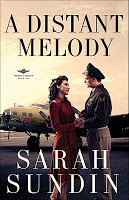 Who doesn't want to do something good for God? We love Him. We want to please Him. We want to sacrifice something for Him.
Who doesn't want to do something good for God? We love Him. We want to please Him. We want to sacrifice something for Him.However, if we're not careful, service and sacrifice can come between us and the Lord. In my first novel, A Distant Melody, Lt. Walter Novak and Allie Miller both make sacrifices in their lives to please God - but what He really wants is for them to obey regarding certain issues. Ultimately they realize they were only out to please themselves rather than the Lord.
In 1 Samuel 15, King Saul disobeys God's command to slay all the Amalekites, including their livestock. He makes the excuse that he saved the best sheep to sacrifice to the Lord. However, that wasn't what God asked him to do. The prophet Samuel confronts Saul and reminds him, "'Does the Lord delight in burnt offerings and sacrifices as much as in obeying the voice of the Lord? To obey is better than sacrifice, and to heed is better than the fat of rams'" 1 Samuel 15:22.
Do we choose our own sacrifices as Saul did? Do we busily serve in the church while ignoring God's call to something else, perhaps something less pleasant? Do we follow legalistic rules but not the Lord's deeper commands? Do we give our leftover time and money, thinking God will be pleased with scraps?
Yes, God calls for sacrifice, and obedience often requires sacrifice. However, sacrifice without obedience does not please the Lord.
"For I desire mercy, not sacrifice, and acknowledgement of God rather than burnt offerings" Hosea 6:6.
Have you ever found yourself choosing sacrifice over obedience?
Published on January 21, 2011 05:00
Today in World War II History
70 Years Ago—Jan. 21, 1941: Fascist Iron Guard attempts to overthrow Antonescu in Romania. Finland joins Axis.
Published on January 21, 2011 03:00
January 20, 2011
Today in World War II History
70 Years Ago—Jan. 20, 1941: President Roosevelt inaugurated for his third term. The US Senate has 28 Republicans and 72 Democrats; the House of Representatives has 162 Republicans and 268 Democrats.
Published on January 20, 2011 03:00



